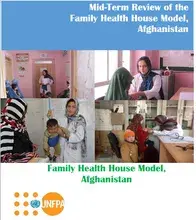Jalalabad, 18 May 2014 - One hundred and fifty religious scholars from across Kunar, Nuristan, Laghman, Nangarhar came together in Jalalabad to discuss family planning / birth spacing in the light of Islam during a three-day conference. The conference was organized by the Ministry of Public Health, the Ministry of Haj and Religious Affairs, the Ulema Shura and the Academy of Science, with the support of the United Nations Population Fund, UNFPA.
The objectives of the conference were to obtain support from religious scholars on family planning / birth spacing in order to improve the health of mothers and children and save their lives; and to reach consensus and raise awareness among the religious leaders on the teachings of the Sharia Law on family planning / birth spacing.
"Because religious scholars have considerable ethical and legal influence in the society and possess a very close connection with the people in the society, they have a major role in public awareness, and can provide satisfactory responses to people about family planning / birth spacing, and early marriage in the light of Islam", said Younus Payab, Assistant Representative of UNFPA in Afghanistan at the fourth conference on Islam and Family Planning / Birth Spacing. The first was held in Kabul in 2012 and the second and third were organized in Herat and Mazar-e Sharif in 2013.
In Afghanistan, 90 percent of married women know at least one type of family planning method but only 22 percent use these methods. One of the main factors that appears to hinder access to family planning services is the belief that using contraceptives to delay births is forbidden by Islam.
During the conference scholars organized round table discussions, where participants shared their findings and the results of their research with scholars from the four provinces about Islam and family planning / birth spacing. They will discuss Quranic verses and Hadith of Prophet Mohammad on safe motherhood, family planning / birth spacing, early marriage, and their effect on mother's and children's nutrition. At the end of the conference, a statement will be released in collaboration with all the participants defining family planning in the light of Islam, and addressing misconceptions about family planning and the use of contraceptives. The statement was signed by all the religious scholars from the four provinces with the commitment of promoting family planning / birth spacing in their respective communities.





